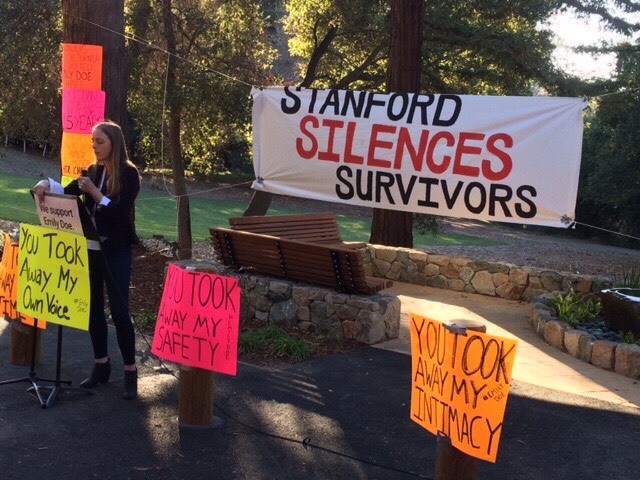On Friday afternoon, approximately 60 Stanford community members gathered outside Kappa Alpha to demand that Stanford use a quote chosen by Brock Turner’s victim for a memorial plaque marking the site of her 2015 sexual assault.
The “speak-out,” organized by the Stanford Association of Students for Sexual Assault Prevention (ASAP), came on the heels of a controversy that began when Stanford rejected the use of two quotes selected by Turner’s victim, known publicly as “Emily Doe.” These quotes were drawn from the statement she addressed to Turner at his 2016 sentencing. Following the University’s rejection of her proposed quotes, Doe dissociated from the memorial plaque process.
University spokesperson E.J. Miranda said that Doe’s selections “were inconsistent with a contemplative space,” and that one of them was potentially triggering to sexual assault survivors.
Instead, Stanford proposed alternative quotations from the statement – including “I’m right here, I’m okay, everything’s okay, I’m right here” — which were widely criticized by students, faculty and alumni in a petition organized by ASAP.
According to its co-authors, Stephanie Pham ’18, ASAP co-founder and speak-out organizer, and Matthew Baiza ’18, the petition called on Stanford to rescind its proposed quotes and immediately install the memorial plaque with the quote Doe originally chose.
Pham says that the petition has garnered over 600 signatures from Stanford community members. She added that she took the positive response to the petition as an indication that there would be support for an event in which students could publicly “listen to, believe and support survivors of sexual violence.”
University spokesperson E.J. Miranda wrote in an email to The Daily that Stanford embraced the suggestion from Emily Doe’s representatives to create a space for reflection. Though Doe’s representatives informed the University she is no longer interested in a quote, he said “[the garden] serves the intended purpose for our community.”
During the speak-out, students read portions of Doe’s statement, called the campus community to action and shared personal stories relating to sexual assault.
According to Pham, the speak-out was organized around Doe’s victim-impact statement to “bring the survivor’s voice back into [the] space where it was silenced.” Signs with quotations from Doe’s statement, such as “You took away my worth,” surrounded speakers at the event.
Student speakers included ASSU President Justice Tention-Palmer ’18, ASAP leader Jacqueline Lin ’18 and ASSU senators Gabe Rosen ’19 and Katie Hufker ’18. The students addressed a variety of topics related to Stanford’s sexual assault policies and rape culture.
“No one should be ignored or censored, especially those who have already experienced the disrespect of doubt and the pain of being silenced,” Rosen said during his speech. “We are here today to say that Stanford’s dismissal of Emily Doe’s chosen quote is unacceptable, especially after Stanford agreed to give her autonomy.”
Pham said that she was initially proud of Stanford’s decision to remove the dumpster near the site where Doe was assaulted and replace it with a scenic marker, seeing it as a sign the University accepted responsibility for Doe’s assault. When Stanford rejected Doe’s proposed quotes, however, Pham said she interpreted it as “an act of further silencing.”
“If the University goes forward with one of its proposed quotes, it’s just another act of the University rewriting the story for the survivor and taking away her voice,” she said.
The event comes a week after Stanford law professor and activist Michele Dauber received a written rape threat in an envelope that also included a suspicious powder. Dauber’s petition to recall Judge Aaron Persky ’84 M.A. ’85 – who, according to petition supporters, gave Turner too lenient of a sentence – has exceeded the number of valid signatures needed to qualify for the June 5 ballot.
“It’s very clear that Stanford has a problem,” said Shanta Katipamula ’19 in reference to sexual violence on campus, the University’s handling of the last Campus Climate Survey, its response to the Brock Turner case and its aftermath and recent student and faculty allegations of sexual assault and harassment.
“I think the common thread through all of this is how … Stanford handled it, and, in most situations, it’s handled it very poorly,” Katipamula added.
Commenting on the effect she hoped the speak-out would have, Alexis Kallen ’18 said, “I hope that Emily Doe feels like she is valued and she is listened to. We are here to fight for her and people like her.”
Contact Michal Leibowitz at michalgl ‘at’ stanford.edu.
